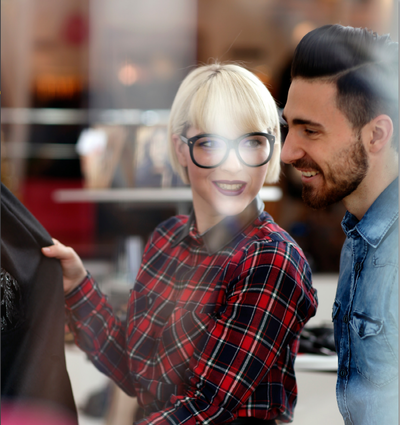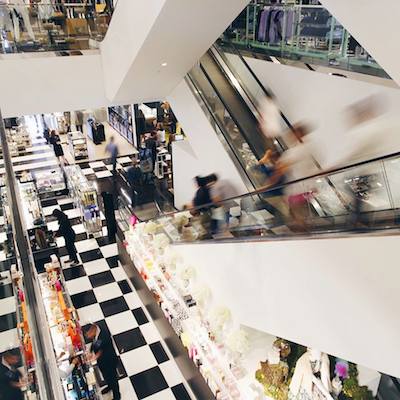 Image courtesy of Printemps
Image courtesy of Printemps
When it comes to personalization, retailers’ ideas of their own capabilities are often inflated when compared to consumers’ assessments. A TimeTrade report found that while 69 percent of retailers say they are delivering an individualized shopping experience to customers all of the time, only 26 percent of consumers agree that the retailers are successfully providing a consistent experience across all channels. This divide shows definite room for improvement among retailers as they seek to provide a positive, personalized customer experience.
"This disconnect stems from how retailers define 'personalization'–as providing a consistent experience across all channels–and how they deliver that personalized experience," said Lauren Mead, vice president of marketing at TimeTrade.
"Let’s say a customer who has loyalty rewards enters a store–great chance to personalize the customer experience," she said. "Unfortunately, that customer will likely remain anonymous until point of purchase. By then it’s too late for personalization."
TimeTrade’s “Personalization in Retail: A Reality Check” is based on a survey of 10 C-level retail executives and 2,064 consumers.
Expectation vs. reality For 93 percent of retailers, personalization is part of their organization’s strategy. The most widespread definition of personalization among respondents was having a consistent customer experience across channels, with the interaction between a sales associate and a consumer coming in a close second. Less common definitions include being able to make personalized offers by having a 360 degree view of the consumer and delivering personalized messaging through digital channels. Asking consumers about the most frequent definition of personalization, TimeTrade found that 55 percent believe that retailers somewhat deliver across channels, while 20 percent say great improvement is needed. Shoppers have a different opinion on personalization than retailers
Consumers’ opinions of a need for improvement do not match up with retailers’ ideas of their own prowess. Only 25 percent have any plans for new personalization initiatives within the next year and a half, while 69 percent believe they are already at peak personalization performance.
For those who are planning upgrades, training in-store associates tops their priority list, with 74 percent intending to do so in the coming 18 months. Targeted marketing campaigns, social selling and clienteling are also goals for at least 40 percent of respondents.
The in-store environment is the top concern for retailers looking to boost their customer experience, with 45 percent agreeing it is their number one priority. The next closest channel is social media, at 19 percent.
When consumers were asked to share which channel they believe provides the worst customer service, call centers came in first for half of respondents, followed by in-store, with 26 percent agreeing it could use improvement.
Shoppers have a different opinion on personalization than retailers
Consumers’ opinions of a need for improvement do not match up with retailers’ ideas of their own prowess. Only 25 percent have any plans for new personalization initiatives within the next year and a half, while 69 percent believe they are already at peak personalization performance.
For those who are planning upgrades, training in-store associates tops their priority list, with 74 percent intending to do so in the coming 18 months. Targeted marketing campaigns, social selling and clienteling are also goals for at least 40 percent of respondents.
The in-store environment is the top concern for retailers looking to boost their customer experience, with 45 percent agreeing it is their number one priority. The next closest channel is social media, at 19 percent.
When consumers were asked to share which channel they believe provides the worst customer service, call centers came in first for half of respondents, followed by in-store, with 26 percent agreeing it could use improvement.
 Bloomingdale's Palo Alto store
Despite the rise in digital and mobile marketing in recent years, consumers still rely heavily on in-store sales associates to assist them in making purchases, according to a recent report by the Luxury Institute.
The majority of consumers surveyed reported making most of their purchasing decisions in-store without researching online beforehand. Luxury brands looking to improve consumer relations should focus more attention on improving the in-store retail experience and providing consumers with ready assistance (see story).
Bloomingdale's Palo Alto store
Despite the rise in digital and mobile marketing in recent years, consumers still rely heavily on in-store sales associates to assist them in making purchases, according to a recent report by the Luxury Institute.
The majority of consumers surveyed reported making most of their purchasing decisions in-store without researching online beforehand. Luxury brands looking to improve consumer relations should focus more attention on improving the in-store retail experience and providing consumers with ready assistance (see story).
"Top luxury brands can personalize better by emphasizing the physical store as an opportunity to tailor the shopping experience to each consumer and training in-store associates to use relevant technology and data to improve the customer experience," Ms. Mead said.
"Execution here is critical- there are many proven technologies that retailers can use that will help automate processes for store associates and also the consumer," she said. "Simple automation and self-service can enable consumers to have a seamless experience and help them engage sooner with associates for more prompt service."
Mobile mindset One key area that could assist retailers in delivering a positive in-store experience is the incorporation of technology. Only 42 percent of retailers say their associates use a mobile device or tablet on the sales floor, while 15 percent of employees use their own phones for business within the retail environment. Rather than dissolving consumers’ trust in an associate, more than half of respondents say they would be more confident about their prospects of having prompt, personal service if their contact is using a mobile device to communicate with other employees. Technology could also facilitate luxury services, such as in-store appointments. When asked if they would schedule an appointment with an associate on a device of their choosing, 59 percent of respondents said they would. When asked about touchpoints they would like to offer for hypothetical appointments, retailers said that text notifications would be most helpful. This was followed by enabling associates to coordinate with each other via mobile devices to handle traffic in the lobby."Tools like online appointment booking can help retailers anticipate which customers will be coming into their store, why they are coming and make sure there is a knowledgeable associate ready to serve them," Ms. Mead said. "This enables personalization from the start.
"To make this to happen, retailers need to also invest in putting more technology in the hands of store associates: 43 percent of retailers report not currently having their store associates using mobile devices," she said. "Considering that more than half of consumers feel confident of receiving prompt and knowledgeable help if they see associates using mobile devices to help customers, this is a missed opportunity on retailers’ part."
Rather than harming the luxury shopping experience, technology can allow retailers to speak to consumers on an individual level. Department store chain Barneys New York is furthering its omnichannel capabilities through the use of integrated iBeacon technology and a personalization platform. Powered by RichRelevance’s Relevance Cloud, Barneys is emphasising its dedication to creating an in-store experience enhanced by digital touchpoints. The initiative has created a first-of-its-kind digital customer experience at Barneys’ recently opened downtown flagship in Manhattan’s Chelsea neighborhood (see story)."The key is selecting technology that enables in store associates to better assist customers rather than replace human to human interaction," Ms. Mead said.
"With this type of technology training is critical," she said. "Retailers must invest the time and resources to ensure that in-store associates are fluent in the relevant technology and can utilize it on the fly, enabling and not distracting the associate from from serving the customer and proving the best possible experience."
